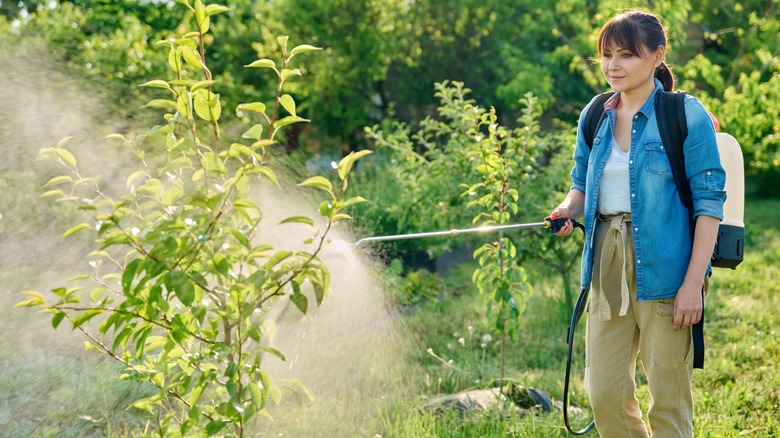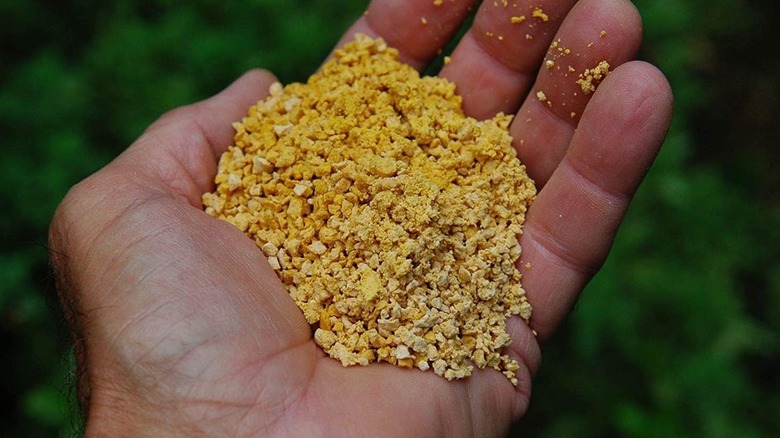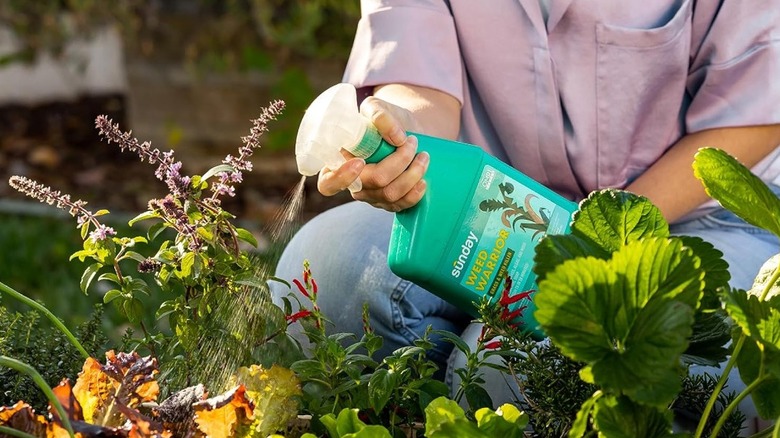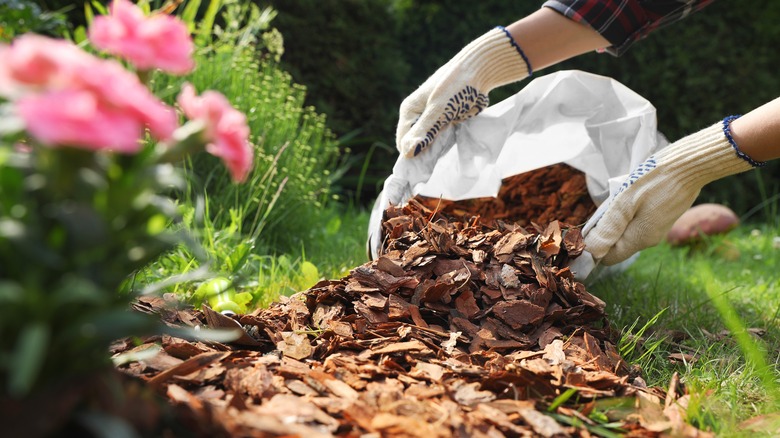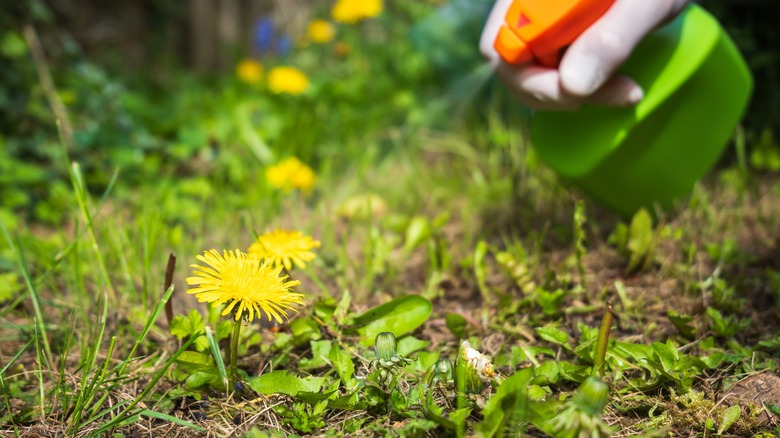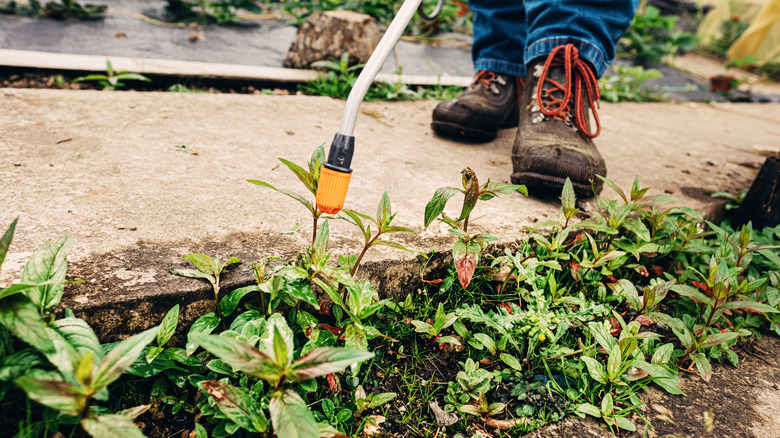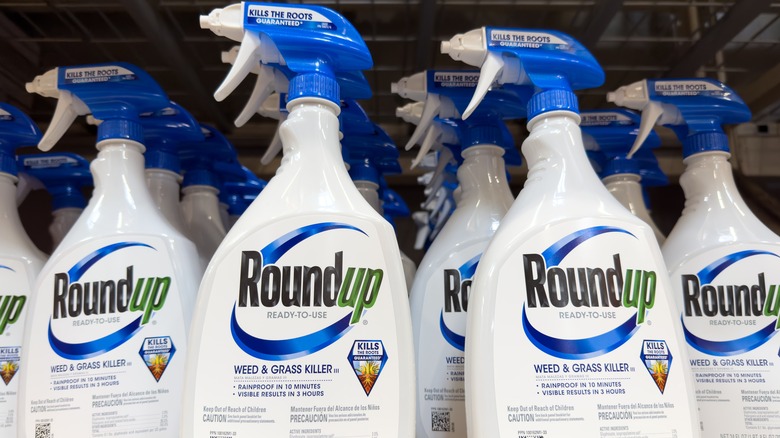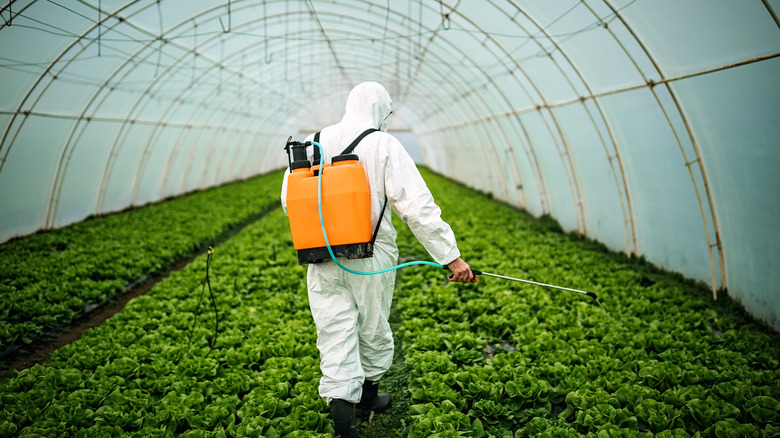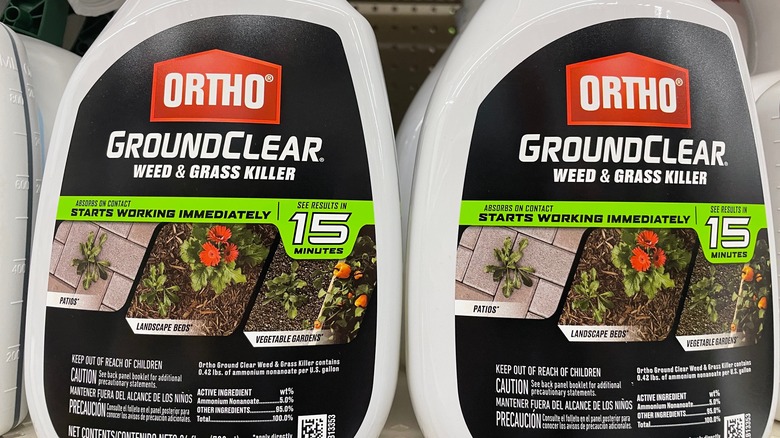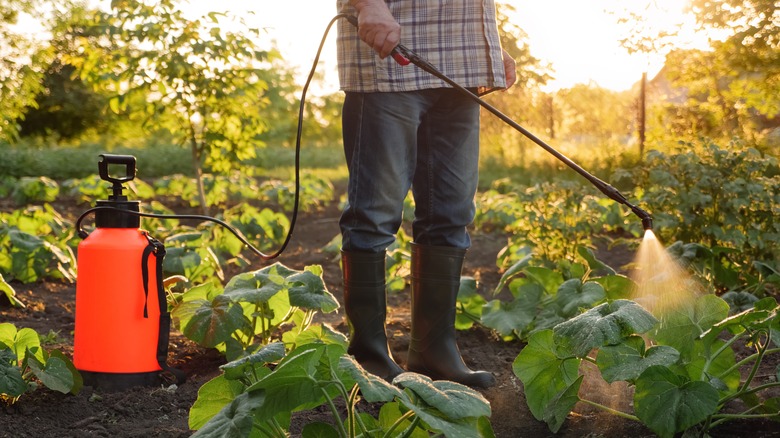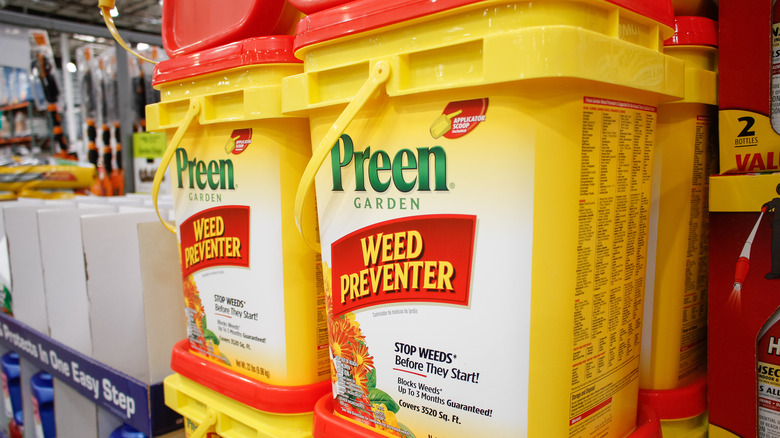The 7 Safest Types Of Weed Killer To Use In Your Vegetable Garden (& Which To Avoid)
We may receive a commission on purchases made from links.
When you're trying to grow a healthy vegetable garden, there are many factors to keep in mind. You need to make sure your plants are getting sufficient sun and water, you must protect them against pests, and you must find an effective solution to keep weeds away. Safe weed killers are important in any garden space, but they are even more important in a vegetable garden with crops that you or your family will be eating. The last thing you want to do is to inadvertently threaten someone's health by using an unsafe herbicide.
Doing nothing also isn't an option, as the weeds will completely take over the place and decrease your yield. We interviewed several gardening experts, who each shared their exclusive insights with House Digest. Learn more about which weed killers they recommend — and which they advise staying away from — to keep weeds from taking over your vegetable garden without compromising safety.
Try horticultural vinegar or vinegar-based herbicides to kill weeds
Vinegar-based weed killers offer a safer alternative to other products that rely on harmful chemicals. In an exclusive interview with House Digest, Brian Clayton, the CEO at GreenPal, shared some pointers about using vinegar for weed control. He says, "For vinegar, use a 20% horticultural vinegar, but be careful—it'll kill anything it touches." Vinegar works by causing the cell membranes to break down, effectively killing the plant. If you want to try it, Clayton recommends choosing a calm day, where there isn't a lot of wind, to apply it on the weeds in the garden. This way, you won't need to worry about the breeze accidentally transporting the effective killer to the wanted crops in your garden.
David Miller, an arborist and the founder of Austin Tree Services, explains that you can find vinegar-based herbicides from local and online retailers. He recommends the EcoGarden Pro Organic Weed Killer. Miller says, "Made from a vinegar base, EcoGarden Pro is non-toxic, which means it won't harm pets, pollinators, or your beloved veggies. It's safe to use in and around vegetable beds without worrying about soil contamination or plant damage." If you're going to use any vinegar herbicides to fight weeds, you'll find the greatest success if the weeds are still young and weaker. You'll also need to be sure to thoroughly spray each weed if you want to kill it and ensure it doesn't grow right back. Be prepared to spray it several times over the course of a week or two before it's fully eradicated.
Apply corn gluten meal as a pre-emergent
When you're looking to prevent weeds from appearing in your vegetable garden, corn gluten meal offers a safe and natural solution. Also known as CGM, this substance is the by-product that results from wet milling corn to process it. It is completely natural and contains more than 50% protein. In addition to being used for feeding animals, Clayton explains, "Corn gluten meal works as a pre-emergent, stopping weeds before they start."
You can find both granulated and powdered corn gluten meal to use as a pre-emergent, though many find it easier to apply the granulated variety. If you want to use it, you'll have to apply it to your vegetable garden before you see any weeds, but after the seedlings or transplants you're growing have sprouted and strengthened. Remember, corn gluten meal, such as the Soil Mender Horticultural Gluten Meal or CZ Grain Corn Gluten Meal is a pre-emergent. As Clayton explains, "It won't kill existing weeds, but it's great for keeping them from popping up." As an added benefit, corn gluten meal is also high in nitrogen, which allows it to function as a slow-release fertilizer for the crops in your garden.
Opt for herbicidal soap if you want a safer commercial product
Ben McInerney, CEO of Go Tree Quotes, told House Digest that he generally recommends using organic methods over chemical weed killers for vegetable gardens. However, for those who are looking for something they can purchase at a store or online, he cites organic herbicidal soaps as a safer alternative to other toxic herbicides. According to McInerney, herbicidal soaps "contain fatty acids that break down quickly and are less likely to harm vegetables."
One option you could consider is the Weed Warrior Grass & Weed Killer from Sunday. Like other herbicidal soaps, this option uses fatty acids to dehydrate and kill weeds. If you decide to go this route, you'll need to be very purposeful when applying them. Not only could they kill wanted crops if they are accidentally sprayed, but they won't effectively kill the entire weed if not thoroughly applied to the whole plant.
Mulching offers a chemical-free way to control weeds
When you're searching for the least harmful ways to kill weeds, mulching is one option to consider. McInerney recommends "applying organic mulch like straw or wood chips around vegetables to suppress weeds." The reason mulch can be so effective is that it stops weed seeds from being able to germinate. The sun can't reach the seedlings, and without it they can't grow.
Miller highlights additional ways mulch can benefit your vegetable garden. "It also helps retain moisture and keeps the soil cool for your veggies. You're not just throwing down mulch — you're setting the stage for a weed-free, lush garden," he says. Before applying mulch to your garden, you'll want to remove any weeds that have already sprouted so they don't continue to grow. Then, apply a thick layer of mulch — between 2 and 3 inches — to effectively keep new weeds from popping up in the garden. However, keep in mind that mulch is combustible and can easily catch fire. To ensure it doesn't spontaneously combust, make sure it's not piled too deeply or compactly, doesn't become excessively dry (especially if there is a drought), and isn't used near any gas tanks or lines.
Try d-limonene for short-term weed control
If you haven't heard of d-limonene before, now is the perfect time to learn about this natural, yet effective, weed killer. Miller recommends weed control products that use d-limonene, such as the Avenger Organic Weed Killer. He explains, "Avenger is made from citrus oil (d-limonene), which strips the waxy coating off weeds, causing them to dry out fast." The formula is non-toxic and OMRI-listed, meaning it is safe to use with organic produce. Miller says that he also likes this weed killer because "it works quickly — you'll see results in just a few hours. It's like hitting the weeds right where it hurts without causing a ripple effect in your garden's health."
There are a few things to consider if you're going to try a d-limonene weed killer. Like herbicidal soaps, it is only effective at killing the parts of the weed that it actually comes into contact with. This means that it may not be sufficient when tackling weeds with deeper or more established root systems or may require several applications.
Iron-based selective herbicides break down more quickly, making them a safer alternative
Those looking for a commercially-available product may also want to consider iron-based selective herbicides, such as Fertilome Weed Free Zone or Bonide Weed Beater Fe. Featuring chelated iron as their active ingredient, McInerney explains that these herbicides are "primarily used for lawns but can be safer around vegetable gardens than traditional herbicides. These products are considered safer because they break down quickly in the environment and have minimal residual effects." They are considered a selective herbicide because of their ability to target broadleaf weeds, which absorb the soluble iron agent more easily and effectively. The agent works quickly too. Within a few hours of spraying the herbicide, weeds will be dried and shriveled up.
There are a few caveats to using iron-based selective herbicides in your garden to keep in mind, however. As a newer alternative to toxic chemicals, more research still needs to be conducted to learn more about these herbicides (such as which types of weeds they are most effective on, whether they may also kill certain types of grass or other plants, and their long-term impacts). McInerney notes that he "recommend[s] using them sparingly and with caution in vegetable gardens." He adds, "Always follow label instructions carefully and avoid direct contact with your vegetable plants."
Some plain boiling water can kill weeds
If you'd prefer to try chemical-free solutions, look no further than your kitchen faucet. Fill a pot with water, bring it to a boil on the stove, and pour it over any weeds growing in your vegetable garden. "It's an inexpensive, natural way to kill weeds without harming your veggies," says Miller. You'll see the best results when you use boiling water to kill small weeds. Unlike some chemical sprays, it only works as a contact herbicide, so it won't kill sections of the plant that it doesn't actually touch.
There are a few things to keep in mind before you start heating up that pot of water. First, as Miller says, "Just be sure to avoid splashing it onto your plants — this stuff is meant to be targeted!" The boiling water will kill anything it touches, so consider using a tea kettle or a pitcher that will allow for more precise application. Also, boiling water is, obviously, very hot. Be sure to protect yourself when working with it. Wear long pants and closed-toed shoes in case any splashes onto you when tending to the weeds in the garden.
Avoid using Roundup or other weed killers with glyphosate
When you think about killing weeds, one name that probably comes to mind is Roundup. However, while this weed killer used to be very popular — and is even still available today — you should think twice about using Roundup, especially in a vegetable garden. Clayton advises to stay away from Roundup and any other weed killers formulated with glyphosate. "These chemicals are not only harmful to your garden but can leach into your veggies, posing serious health risks."
While glyphosate is effective at killing weeds (and most other plants it touches) by inhibiting an essential metabolic pathway, it also poses a serious health risk. According to research, glyphosate is linked to cancer. In fact, thousands of Roundup users who developed cancer have filed lawsuits against Bayer (the parent company), claiming that the company was aware of the risks of using the product, but still continued to sell it to customers.
Don't use 2, 4-D herbicides near your garden
2,4-dichlorophenoxyacetic acid herbicides, more commonly referred to as 2, 4-D herbicides, are designed to target weeds after they've emerged (post-emergent). Many herbicides on the market are classified as 2, 4-D products. And, while these herbicides may be popular and readily available, McInerney strongly recommends against using them in a vegetable garden. He explains that the herbicides "can drift and damage vegetables." But, that isn't the only harm they can do.
Beyond threatening the safety of your current crop of veggies, McInerney shares that these herbicides also have the "potential [to cause] long-term soil effects." This means that they could impact future crop harvests as well. And, while more studies are needed, some researchers are drawing a link between the use of 2, 4-D herbicides and certain cancers, such as sarcoma and non-Hodgkin's lymphoma. So, to play it safe, you might want to avoid using these sprays in all areas of your lawn and garden, not just around your vegetable patch.
Do not use ammonium nonanoate around crops or vegetable gardens
While you may use a product such as Ortho Ground Clear, which is formulated with ammonium nonanoate, to clear weeds from walkways or your lawn, it isn't recommended for use in a vegetable garden. In an exclusive interview with House Digest, Tom Monson, the owner of Monson Lawn & Landscaping, said, "Ammonium Nonanoate (Ortho Ground Clear) is another weed control that should stay away from gardens."
There are a few problems with using Ortho Ground Clear around a vegetable garden. First, the manufacturer specifically recommends against using it in near food or feed crops. Second, the United States Department of Agriculture declined to list this weed killer as a safe option for crops. Members of the USDA National Organic Standards Board cited concerns with biodiversity. They were worried that it might inadvertently kill beneficial bugs, hurt the microorganisms in the soil, or be toxic to aquatic invertebrates. With these recommendations from the USDA, combined with those from Monson, this is one weed killer you'll want to avoid in your vegetable garden — and potentially the rest of your yard. One of the main reasons the USDA declined to include it as safe for use on crops was because of the numerous safer options out there, such as mulching, corn gluten meal, or the other alternatives shared above.
Steer clear of triclopyr-based herbicides
When you're searching for the safest weed-killing options for your vegetable garden, you won't want to use any triclopyr-based herbicides. According to McInerney, these herbicides "persist in soil and may be absorbed by vegetables." Triclopyr-based sprays have the potential to cause a range of side effects.
Exposure to them can cause eye irritation, dizziness, gastrointestinal issues, respiratory problems, and more. The EPA classified the sprays as "not classifiable as to human carcinogenicity," meaning there isn't enough information to conclude whether they can cause cancer. However, in the EPA's studies with rats, exposure to the herbicide did lead to an increase in mammary tumors. With all of these potential issues and lack of full understanding, it is probably safest to just avoid using triclopyr-based herbicides and stick with a safer alternative.
Don't risk it with trifluralin-based sprays
Preen Garden Weed Preventer is another commercially-available product you might not want to use in your vegetable garden. However, while you can use this product in other areas of your lawn, you'd be taking a risk to use it in your vegetable garden. Miller explains, "Preen contains a chemical called trifluralin, which is a pre-emergent herbicide. While it's great for ornamental beds, it's not the best bet for vegetable gardens, especially if you're growing from seeds."
As a pre-emergent, Preen is formulated to prevent weeds from even sprouting. However, as Miller explains, weeds aren't the only thing it may prevent from growing. He says, "It can stop your veggies from sprouting, so you might find yourself wondering why nothing's growing. Better safe than sorry with this one." If you're looking for a safer pre-emergent weed killer, consider corn gluten meal which was highlighted above.

